The Amerizilians: Jiu-Jitsu Practitioners For Whom Brazil Is A Second Home
The Amerizilians: Jiu-Jitsu Practitioners For Whom Brazil Is A Second Home
Three successful black belts from North America experienced the jiu-jitsu lifestyle firsthand when they were still teenagers. Their time in Brazil set them on the path of training, teaching, and competing for a living.

Experiencing jiu-jitsu in Brazil is a bucket list item for many who train. For those from the United States it's maybe not as sought-after as it once was, considering the many talented Brazilians who immigrated and opened academies all over the country.
Three successful black belts from North America experienced the jiu-jitsu lifestyle firsthand when they were still teenagers. Their time in Brazil set them on the path of training, teaching, and competing for a living.
Meet the Amerizilians…
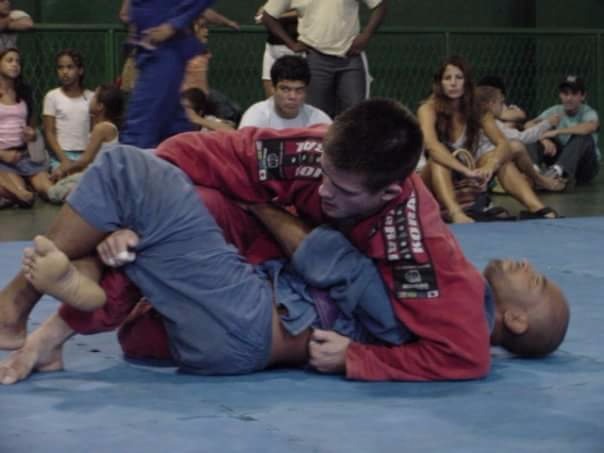 Canadian Jake Mackenzie first went to Brazil as a new blue belt in 2003. His high school friend (who had gone to Brazil as an exchange student) gave him the initial connection and for two months he spent time in Vitoria, Espirito Santo at the age of 17. He was able to train during that first visit, however it was in 2004 when he returned and trained under Eduardo 'Jamelao' Conceicao that he felt an influence on his game.
Canadian Jake Mackenzie first went to Brazil as a new blue belt in 2003. His high school friend (who had gone to Brazil as an exchange student) gave him the initial connection and for two months he spent time in Vitoria, Espirito Santo at the age of 17. He was able to train during that first visit, however it was in 2004 when he returned and trained under Eduardo 'Jamelao' Conceicao that he felt an influence on his game.
Jake is well-known for his half guard, and he credits this largely to Jamelao. In the 1990's, Jamelao went head-to-head with fellow half guard innovator Roberto "Gordo" Correa. Their competition rivalry helped shaped the modern half guard.
It was specifically the deep half guard and basic techniques from Jamelao that developed Jake's game to this day. The early trips to Jamelao's academy helped solidify Jake's eagerness to routinely train in Brazil each year.
By 2006 he had made the move to Rio de Janeiro and he stayed for eight months on a tourist visa. He actually overstayed his welcome, as the tourist visas only allow one to stay legally for six months at a time. It wasn't the first time he did this, either. For about ten years, the federal police would issue a fine for every time he overstayed, but because it isn't very expensive to pay, he would just hand over the cash and come back in.
Learning Portuguese was of course part of adapting to the culture and so it took him about five years to become fluent. In the first few visits, he was staying with a family that spoke English so he wasn't around the language much. But when he moved to Rio, he stayed in a student commune where no one spoke English so he was able to pick it up faster.
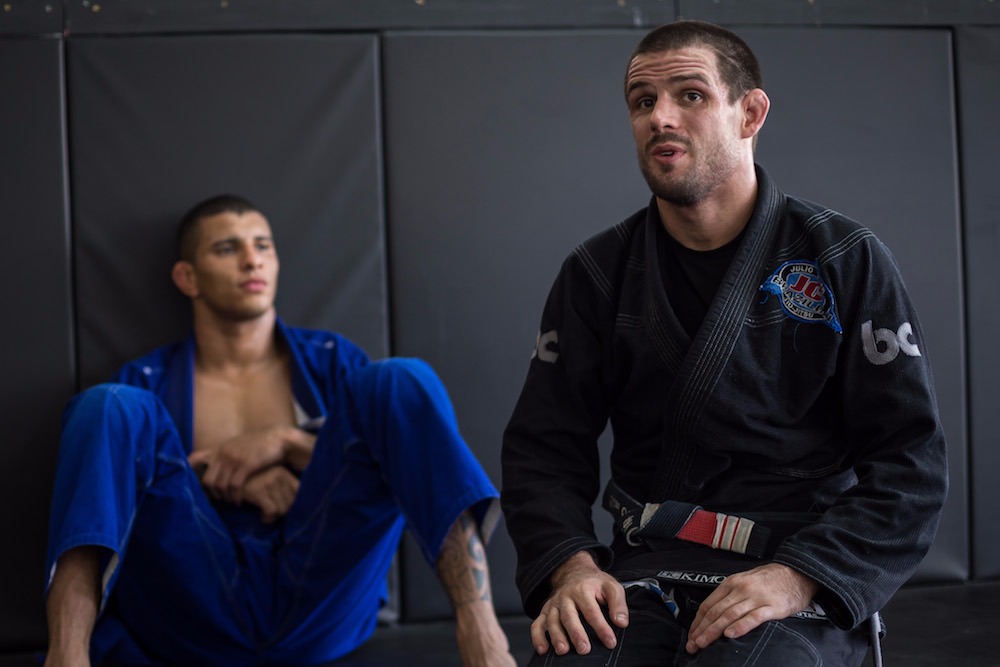
Jake Mackenzie pictured in Ohio in 2017 training for the IBJJF World Championships. Photo: Michael Sears
To make the trip each year Jake would teach seminars and organized local tournaments in Nova Scotia, Canada. At the time, there were no black belts on his end of the country so that made it easier. Along with local companies he approached for sponsorships, he was able to make just enough to get to Brazil each time. His parents also worked to help promote and organize seminars/tournaments and approach potential sponsors.
All before being promoted to black belt, Jake spent much of his time training and competing in Rio -- an opportunity that shaped his jiu-jitsu and life to this day.
"I am from Truro, Nova Scotia, that has a population of about 12,000 people. So going to Rio to me was like living in a completely different world. I got to experience jiu-jitsu at the highest level and get to compete at the best tournaments with all the top guys from Rio every weekend. The brackets were so deep at so many of the little tournaments. I was doing 20-25 tournaments every year, and getting really tough matches every tournament."
In 2010 he was awarded his black belt from Roberto 'Cyborg' Abreu, as he had trained extensively with him from 2006 on. And it was then Cyborg's suggestion that he find the best team to train with in Rio in order to continue his jiu-jitsu journey. when he returned.
Jake had trained at a few gyms already but knew GF Team under Julio Cesar Pereira had the best team in the area. With the help of friend Hillary Williams, he was introduced to Julio and visited the academy once he got back to Rio. "I knew Julio was a very cool guy and I knew that all the guys I had fought from his team were super humble and respectful."
Not long after the move, Jake was selected to be part of the competition team for the Brazilian Nationals Team Championship, where a group of five athletes compete against other teams. GF Team was looking to be the first champions to win the tournament three times, so there was already pressure to do well. But the pressure mounted when the Atos killer team was tied with GF Team and Jake's match against Ed Ramos was to be the determining factor.
"I ended up fighting the fifth and final fight, which decided the tournament. I won a great back-and-forth match against Ed Ramos. The fight was tied up on points and advantages until the last 10 seconds. I was able to sweep to the mount just as the match ended to get the advantage." The gringo prevailed!
The lifestyle that Jake lived while in Brazil is the path he still chooses today. Besides being married to a Brazilian woman and having a visa that doesn't restrict his stay, not much has changed. He still travels all over the world getting to train with many different people and learn from different cultures, but spending time away from family and loved ones is a con.
"For a long term goal, I am gonna just play things by ear like I have always done. I have a couple things left on my jiu-jitsu bucket list and I know that it is much more realistic for me to do them while I am still young. I know having a school and teaching full time is in my future, but I want to learn as much jiu-jitsu as possible and get to experience as many things as possible around the world before I take that step."
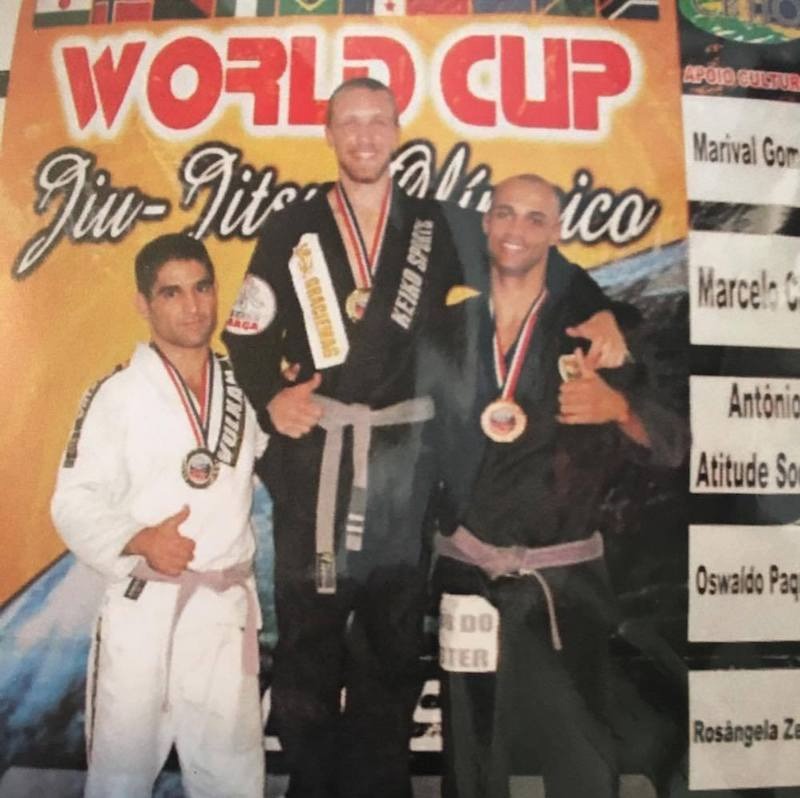 Californian Nathan Mendelsohn had an eerily similar experience to that of Jake's, even ending up with the same team and in the location to train. He too was 17 and a blue belt when he first went to Brazil in 2007 with his instructor Paul Schreiner, who now teaches at the Marcelo Garcia Academy. Nathan had already been training for seven years before the trip to Rio.
Californian Nathan Mendelsohn had an eerily similar experience to that of Jake's, even ending up with the same team and in the location to train. He too was 17 and a blue belt when he first went to Brazil in 2007 with his instructor Paul Schreiner, who now teaches at the Marcelo Garcia Academy. Nathan had already been training for seven years before the trip to Rio.
The apartment where they stayed was right by Gordo's new academy, so this is where they trained. Because the majority of the students were still training at the old location, Paul and Nathan were treated to small training sessions with high-level names like Antonio Braga Neto, Rafael Dos Anjos, 'Celsinho' and more.
Nathan was training what he could with a back injury and was anticipating an absence from the World Championships, which were held in Brazil back then. But to his luck, the IBJJF had moved it to California for the first time and at a later date so Nathan was able to heal and make it back in time to compete there as well.
The connections he made for future trips were made at his home in Santa Cruz, CA. His master Claudio Franca had attended Universidade Gama Filho, a university in Rio that was home to the famous judo team. The university eventually garnered a jiu-jitsu team, which today is now known as GF Team or Grappling Fight Team.
Members of GF Team would come to Claudio's US Open tournament and stay at Nathan's house. One of those athletes was Theodoro Canal. They became friends and Theodoro said he would return the hospitality by offering his house as place to stay in Rio. So that was Nathan's connection to GF Team and how he was able to train under the UGF, Universidade Gama Filho team, before it had even evolved into the now GF Team.
Another connection made was with the Soul Fighters team, as Claudio had came up through the ranks with Master Alvaro Mansur, a cofounder of the team.
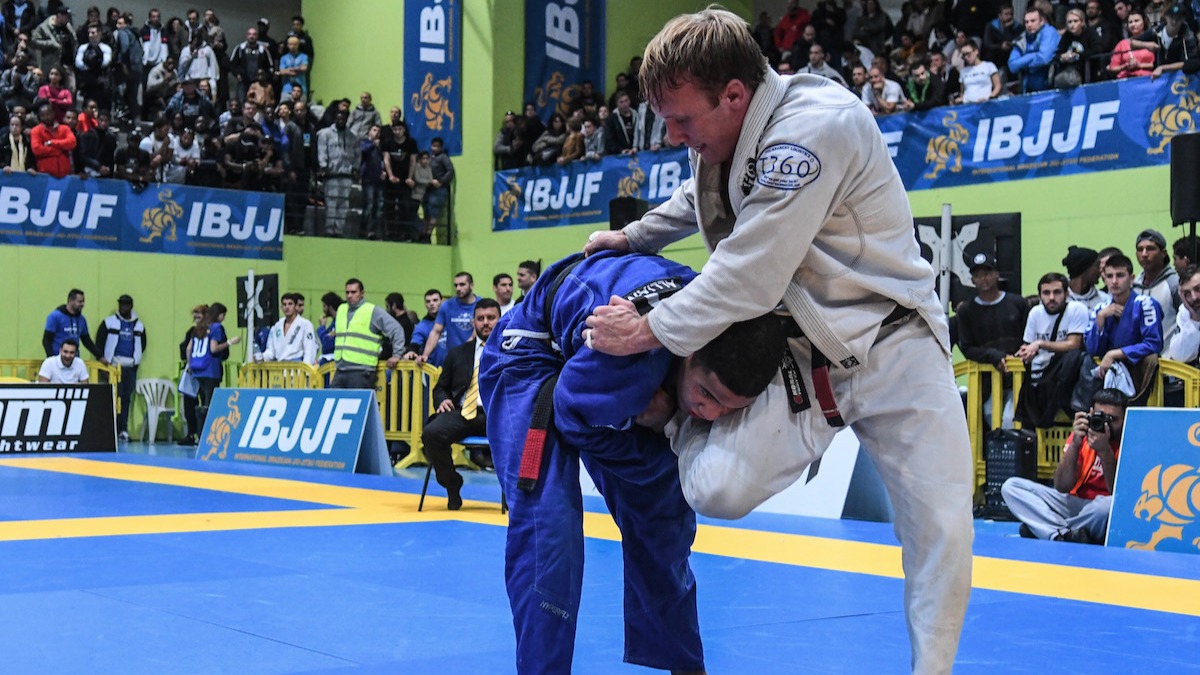
Nathan Mendelsohn defends a takedown at the IBJJF 2017 European Championships. Photo: Chase Smith / FloGrappling
Because the Brazilians were staying at his house and vice versa, there was a lot of opportunities for Nathan to learn Portuguese. He says it took about 3-4 years to become fluent but because he was the only one to communicate between the visitors and his parents, any elementary phrases and words would suffice early on. "They spoke little to no English at the time and my parents spoke absolutely no Portuguese so I was the only way for them to communicate with each other. Thus I felt no embarrassment in trying to speak my broken Portuguese because no one was in a place to judge me for it. I got a lot of practice in that way and once I got to a certain level of Portuguese I was able to start speaking with my English-speaking Brazilian friends as well, like Rafael Eboli and my master Claudio Franca."
It's common for most people to tune out another language and this is a mistake that Nathan says prevents those of us from learning Portuguese. "I spent a lot of time during those first few years not knowing at all what was happening, where I was going or what anyone around me was saying but I learned a lot just by simply paying attention. I learned basically all of my Portuguese from just listening to people speak and trying to pick up on words and then asking what they meant later.
"A lot of people check out when they hear another language being spoken and that's why they never learn or they get to a certain level of "broken English" or "broken Portuguese" and never evolve past that point. After a while I just started trying to speak even though I knew I was making all kinds of mistakes."
During the time that Nathan was traveling to Brazil, the type of training was different than in the States. In Rio, he found the training to be much more "flowing" and "movement-based" while back home it was more old school. Nowadays it is ever evolving and the differences in training aren't as huge as they were ten years ago.
The structure of the classes are mostly mirrored, though. It consists of a warm-up and technique and then sparring. Nathan found that in Brazil, the warm-ups were quick and intense with one or two techniques and then a heavy emphasis on the live training, especially specific training. It is this philosophy -- a lot of positional sparring -- that he tries to embed into his own classes that he teaches.
What made Nathan's experience with Brazil so unique, was that much of the culture was experienced by him in his own home. He was able to host so many of the Brazilians teaching and training at his academy and develop bonds that gave him a gateway to the lifestyle in Rio. His advice for anyone looking to experience the true BJJ lifestyle: "Open your home to some BJJ athletes if you get the chance and they will most likely return the favor to you. Brazilians are some of the most welcoming, warm and friendly people you'll ever meet so if you hang out with friends down there they will make sure you stay safe and have the time of your life."
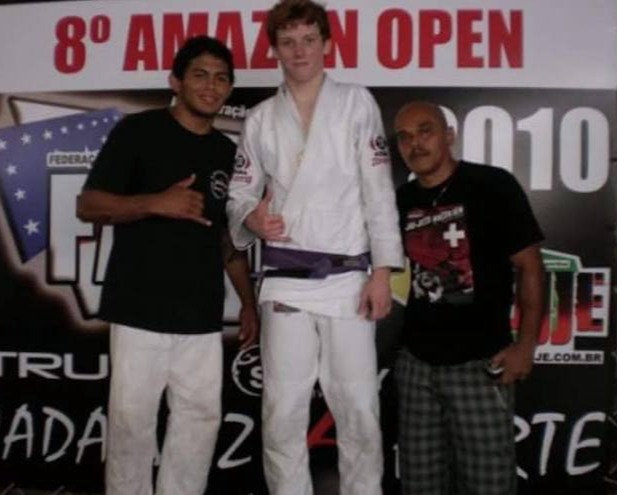 The younger generation of athletes have also been able to experience life in Brazil, even if it doesn't come with any history lessons. Tanner Rice, who received his black belt at 19 after 13 years of training, grew up learning jiu-jitsu with his dad and older brothers. When he was 15, his dad opened what is now Rice Brothers BJJ.
The younger generation of athletes have also been able to experience life in Brazil, even if it doesn't come with any history lessons. Tanner Rice, who received his black belt at 19 after 13 years of training, grew up learning jiu-jitsu with his dad and older brothers. When he was 15, his dad opened what is now Rice Brothers BJJ.
Training at a young age in Redding, CA, there weren't many training partners for Tanner beyond his own brothers. He had befriended black belt Carlos Diego Ferriera, who had traveled to the US to expand his jiu-jitsu career. At the age of 16, Tanner made his first of four trips to Manaus and stayed with Carlos for a year in his home. It was at Club Pina where Tanner earned solid training with up-and-coming superstars like Erberth Santos, Lucas Pinheiro, Thiago Macedo, and Manuel Ribamar.
After numerous trips there -- including one to Sao Paulo -- Tanner became fluent in Portuguese. It's always odd to see a gringo who is fluent in Portuguese, but it helps in many ways. "Knowing Portuguese is extremely beneficial, not to compete so much, but just to get to know people in the sport. I've made a lot of Brazilian friends because of the language."
Ever since his dad's academy opened he hasn't stopped teaching. His dad Rod made a huge impact on his career, making it possible for Tanner to make the trips to Brazil that exponentially grew his knowledge of both the jiu-jitsu game and Brazilian culture. The initial decision to let him travel down south was due to his growth being restricted in Redding. Tanner needed a "bigger outlook on jiu-jitsu" beyond his dad and brothers. That's one way to achieve the real deal.
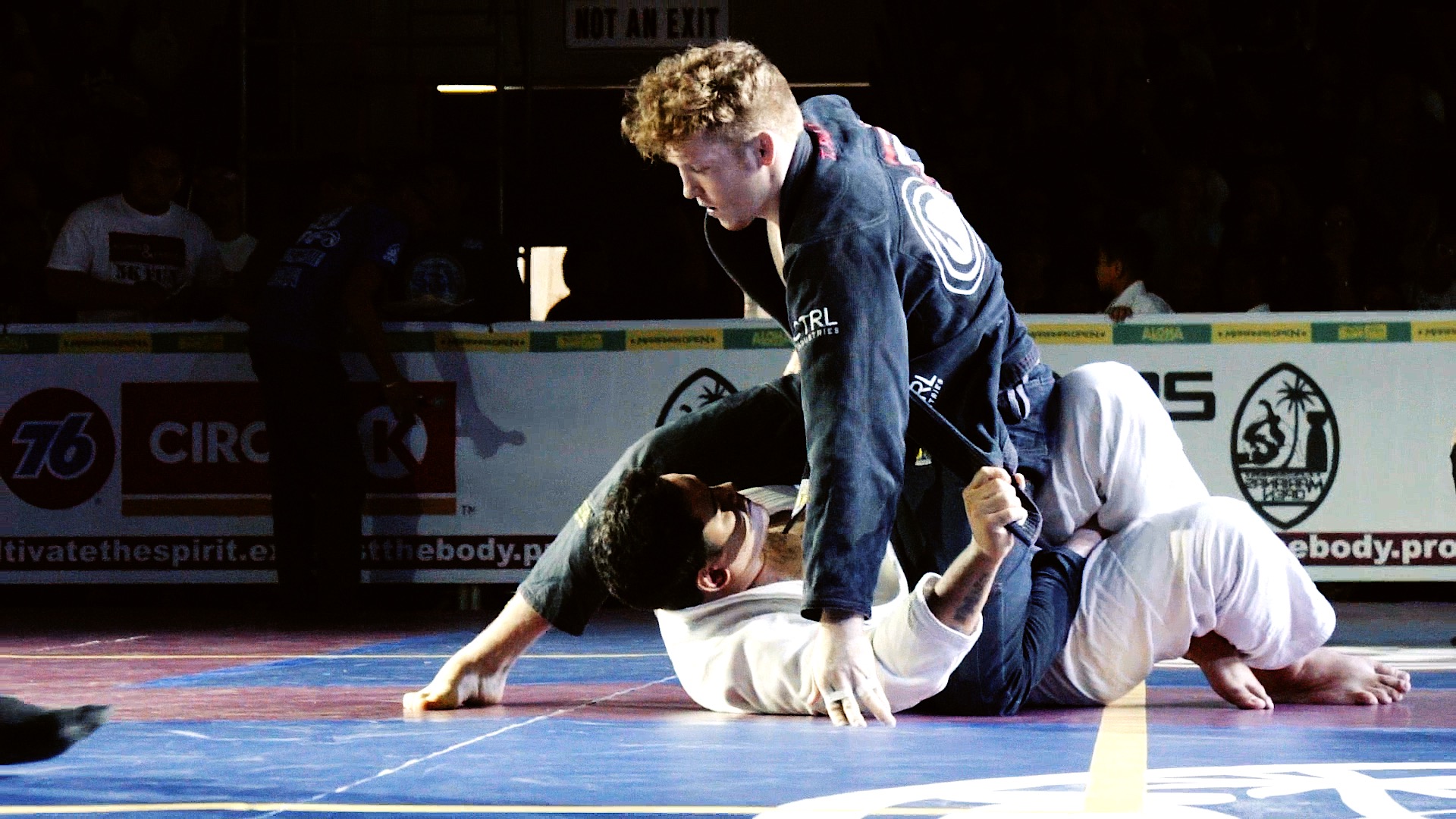
Tanner Rice on top and in control at the Marianas Open in Guam
His dad also pushed him to keep going, even when Tanner felt that jiu-jitsu wasn't for him. "At times I wanted to quit but my dad told me when I was younger if I quit at doing jiu-jitsu I'll quit at everything for the rest of my life. When I became of age to have a mind of my own, I loved jiu-jitsu because my dad never let me quit."
Being in Brazil required him to grow up really quick. Each training session was a war in Manaus, and the plunge from Northern California into the Amazon was a huge leap. But it was the young introduction that started Tanner on the path to where he is now, a top black belt heavyweight competitor and leader of the Rice clan that also consists of younger brothers Sam and Matthew -- two more killers on the mat.
With an academy and competitive wins under his belt at just 24, Tanner has a lot of flexibility with his future career choices but for now he'll keep trying to become the best while college is a consideration in the future.
Three successful black belts from North America experienced the jiu-jitsu lifestyle firsthand when they were still teenagers. Their time in Brazil set them on the path of training, teaching, and competing for a living.
Meet the Amerizilians…
Competing Against The Best On Their Home Turf: Jake Mackenzie
 Canadian Jake Mackenzie first went to Brazil as a new blue belt in 2003. His high school friend (who had gone to Brazil as an exchange student) gave him the initial connection and for two months he spent time in Vitoria, Espirito Santo at the age of 17. He was able to train during that first visit, however it was in 2004 when he returned and trained under Eduardo 'Jamelao' Conceicao that he felt an influence on his game.
Canadian Jake Mackenzie first went to Brazil as a new blue belt in 2003. His high school friend (who had gone to Brazil as an exchange student) gave him the initial connection and for two months he spent time in Vitoria, Espirito Santo at the age of 17. He was able to train during that first visit, however it was in 2004 when he returned and trained under Eduardo 'Jamelao' Conceicao that he felt an influence on his game. Jake is well-known for his half guard, and he credits this largely to Jamelao. In the 1990's, Jamelao went head-to-head with fellow half guard innovator Roberto "Gordo" Correa. Their competition rivalry helped shaped the modern half guard.
It was specifically the deep half guard and basic techniques from Jamelao that developed Jake's game to this day. The early trips to Jamelao's academy helped solidify Jake's eagerness to routinely train in Brazil each year.
By 2006 he had made the move to Rio de Janeiro and he stayed for eight months on a tourist visa. He actually overstayed his welcome, as the tourist visas only allow one to stay legally for six months at a time. It wasn't the first time he did this, either. For about ten years, the federal police would issue a fine for every time he overstayed, but because it isn't very expensive to pay, he would just hand over the cash and come back in.
Learning Portuguese was of course part of adapting to the culture and so it took him about five years to become fluent. In the first few visits, he was staying with a family that spoke English so he wasn't around the language much. But when he moved to Rio, he stayed in a student commune where no one spoke English so he was able to pick it up faster.

Jake Mackenzie pictured in Ohio in 2017 training for the IBJJF World Championships. Photo: Michael Sears
To make the trip each year Jake would teach seminars and organized local tournaments in Nova Scotia, Canada. At the time, there were no black belts on his end of the country so that made it easier. Along with local companies he approached for sponsorships, he was able to make just enough to get to Brazil each time. His parents also worked to help promote and organize seminars/tournaments and approach potential sponsors.
All before being promoted to black belt, Jake spent much of his time training and competing in Rio -- an opportunity that shaped his jiu-jitsu and life to this day.
"I am from Truro, Nova Scotia, that has a population of about 12,000 people. So going to Rio to me was like living in a completely different world. I got to experience jiu-jitsu at the highest level and get to compete at the best tournaments with all the top guys from Rio every weekend. The brackets were so deep at so many of the little tournaments. I was doing 20-25 tournaments every year, and getting really tough matches every tournament."
In 2010 he was awarded his black belt from Roberto 'Cyborg' Abreu, as he had trained extensively with him from 2006 on. And it was then Cyborg's suggestion that he find the best team to train with in Rio in order to continue his jiu-jitsu journey. when he returned.
Jake had trained at a few gyms already but knew GF Team under Julio Cesar Pereira had the best team in the area. With the help of friend Hillary Williams, he was introduced to Julio and visited the academy once he got back to Rio. "I knew Julio was a very cool guy and I knew that all the guys I had fought from his team were super humble and respectful."
Not long after the move, Jake was selected to be part of the competition team for the Brazilian Nationals Team Championship, where a group of five athletes compete against other teams. GF Team was looking to be the first champions to win the tournament three times, so there was already pressure to do well. But the pressure mounted when the Atos killer team was tied with GF Team and Jake's match against Ed Ramos was to be the determining factor.
"I ended up fighting the fifth and final fight, which decided the tournament. I won a great back-and-forth match against Ed Ramos. The fight was tied up on points and advantages until the last 10 seconds. I was able to sweep to the mount just as the match ended to get the advantage." The gringo prevailed!
The lifestyle that Jake lived while in Brazil is the path he still chooses today. Besides being married to a Brazilian woman and having a visa that doesn't restrict his stay, not much has changed. He still travels all over the world getting to train with many different people and learn from different cultures, but spending time away from family and loved ones is a con.
"For a long term goal, I am gonna just play things by ear like I have always done. I have a couple things left on my jiu-jitsu bucket list and I know that it is much more realistic for me to do them while I am still young. I know having a school and teaching full time is in my future, but I want to learn as much jiu-jitsu as possible and get to experience as many things as possible around the world before I take that step."
Learning Portuguese And Experiencing Another Culture: Nathan Mendelsohn
 Californian Nathan Mendelsohn had an eerily similar experience to that of Jake's, even ending up with the same team and in the location to train. He too was 17 and a blue belt when he first went to Brazil in 2007 with his instructor Paul Schreiner, who now teaches at the Marcelo Garcia Academy. Nathan had already been training for seven years before the trip to Rio.
Californian Nathan Mendelsohn had an eerily similar experience to that of Jake's, even ending up with the same team and in the location to train. He too was 17 and a blue belt when he first went to Brazil in 2007 with his instructor Paul Schreiner, who now teaches at the Marcelo Garcia Academy. Nathan had already been training for seven years before the trip to Rio.The apartment where they stayed was right by Gordo's new academy, so this is where they trained. Because the majority of the students were still training at the old location, Paul and Nathan were treated to small training sessions with high-level names like Antonio Braga Neto, Rafael Dos Anjos, 'Celsinho' and more.
Nathan was training what he could with a back injury and was anticipating an absence from the World Championships, which were held in Brazil back then. But to his luck, the IBJJF had moved it to California for the first time and at a later date so Nathan was able to heal and make it back in time to compete there as well.
The connections he made for future trips were made at his home in Santa Cruz, CA. His master Claudio Franca had attended Universidade Gama Filho, a university in Rio that was home to the famous judo team. The university eventually garnered a jiu-jitsu team, which today is now known as GF Team or Grappling Fight Team.
Members of GF Team would come to Claudio's US Open tournament and stay at Nathan's house. One of those athletes was Theodoro Canal. They became friends and Theodoro said he would return the hospitality by offering his house as place to stay in Rio. So that was Nathan's connection to GF Team and how he was able to train under the UGF, Universidade Gama Filho team, before it had even evolved into the now GF Team.
Another connection made was with the Soul Fighters team, as Claudio had came up through the ranks with Master Alvaro Mansur, a cofounder of the team.

Nathan Mendelsohn defends a takedown at the IBJJF 2017 European Championships. Photo: Chase Smith / FloGrappling
Because the Brazilians were staying at his house and vice versa, there was a lot of opportunities for Nathan to learn Portuguese. He says it took about 3-4 years to become fluent but because he was the only one to communicate between the visitors and his parents, any elementary phrases and words would suffice early on. "They spoke little to no English at the time and my parents spoke absolutely no Portuguese so I was the only way for them to communicate with each other. Thus I felt no embarrassment in trying to speak my broken Portuguese because no one was in a place to judge me for it. I got a lot of practice in that way and once I got to a certain level of Portuguese I was able to start speaking with my English-speaking Brazilian friends as well, like Rafael Eboli and my master Claudio Franca."
It's common for most people to tune out another language and this is a mistake that Nathan says prevents those of us from learning Portuguese. "I spent a lot of time during those first few years not knowing at all what was happening, where I was going or what anyone around me was saying but I learned a lot just by simply paying attention. I learned basically all of my Portuguese from just listening to people speak and trying to pick up on words and then asking what they meant later.
"A lot of people check out when they hear another language being spoken and that's why they never learn or they get to a certain level of "broken English" or "broken Portuguese" and never evolve past that point. After a while I just started trying to speak even though I knew I was making all kinds of mistakes."
During the time that Nathan was traveling to Brazil, the type of training was different than in the States. In Rio, he found the training to be much more "flowing" and "movement-based" while back home it was more old school. Nowadays it is ever evolving and the differences in training aren't as huge as they were ten years ago.
The structure of the classes are mostly mirrored, though. It consists of a warm-up and technique and then sparring. Nathan found that in Brazil, the warm-ups were quick and intense with one or two techniques and then a heavy emphasis on the live training, especially specific training. It is this philosophy -- a lot of positional sparring -- that he tries to embed into his own classes that he teaches.
What made Nathan's experience with Brazil so unique, was that much of the culture was experienced by him in his own home. He was able to host so many of the Brazilians teaching and training at his academy and develop bonds that gave him a gateway to the lifestyle in Rio. His advice for anyone looking to experience the true BJJ lifestyle: "Open your home to some BJJ athletes if you get the chance and they will most likely return the favor to you. Brazilians are some of the most welcoming, warm and friendly people you'll ever meet so if you hang out with friends down there they will make sure you stay safe and have the time of your life."
Growing Up Quick In The Amazon: Tanner Rice
 The younger generation of athletes have also been able to experience life in Brazil, even if it doesn't come with any history lessons. Tanner Rice, who received his black belt at 19 after 13 years of training, grew up learning jiu-jitsu with his dad and older brothers. When he was 15, his dad opened what is now Rice Brothers BJJ.
The younger generation of athletes have also been able to experience life in Brazil, even if it doesn't come with any history lessons. Tanner Rice, who received his black belt at 19 after 13 years of training, grew up learning jiu-jitsu with his dad and older brothers. When he was 15, his dad opened what is now Rice Brothers BJJ.Training at a young age in Redding, CA, there weren't many training partners for Tanner beyond his own brothers. He had befriended black belt Carlos Diego Ferriera, who had traveled to the US to expand his jiu-jitsu career. At the age of 16, Tanner made his first of four trips to Manaus and stayed with Carlos for a year in his home. It was at Club Pina where Tanner earned solid training with up-and-coming superstars like Erberth Santos, Lucas Pinheiro, Thiago Macedo, and Manuel Ribamar.
After numerous trips there -- including one to Sao Paulo -- Tanner became fluent in Portuguese. It's always odd to see a gringo who is fluent in Portuguese, but it helps in many ways. "Knowing Portuguese is extremely beneficial, not to compete so much, but just to get to know people in the sport. I've made a lot of Brazilian friends because of the language."
Ever since his dad's academy opened he hasn't stopped teaching. His dad Rod made a huge impact on his career, making it possible for Tanner to make the trips to Brazil that exponentially grew his knowledge of both the jiu-jitsu game and Brazilian culture. The initial decision to let him travel down south was due to his growth being restricted in Redding. Tanner needed a "bigger outlook on jiu-jitsu" beyond his dad and brothers. That's one way to achieve the real deal.

Tanner Rice on top and in control at the Marianas Open in Guam
His dad also pushed him to keep going, even when Tanner felt that jiu-jitsu wasn't for him. "At times I wanted to quit but my dad told me when I was younger if I quit at doing jiu-jitsu I'll quit at everything for the rest of my life. When I became of age to have a mind of my own, I loved jiu-jitsu because my dad never let me quit."
Being in Brazil required him to grow up really quick. Each training session was a war in Manaus, and the plunge from Northern California into the Amazon was a huge leap. But it was the young introduction that started Tanner on the path to where he is now, a top black belt heavyweight competitor and leader of the Rice clan that also consists of younger brothers Sam and Matthew -- two more killers on the mat.
With an academy and competitive wins under his belt at just 24, Tanner has a lot of flexibility with his future career choices but for now he'll keep trying to become the best while college is a consideration in the future.